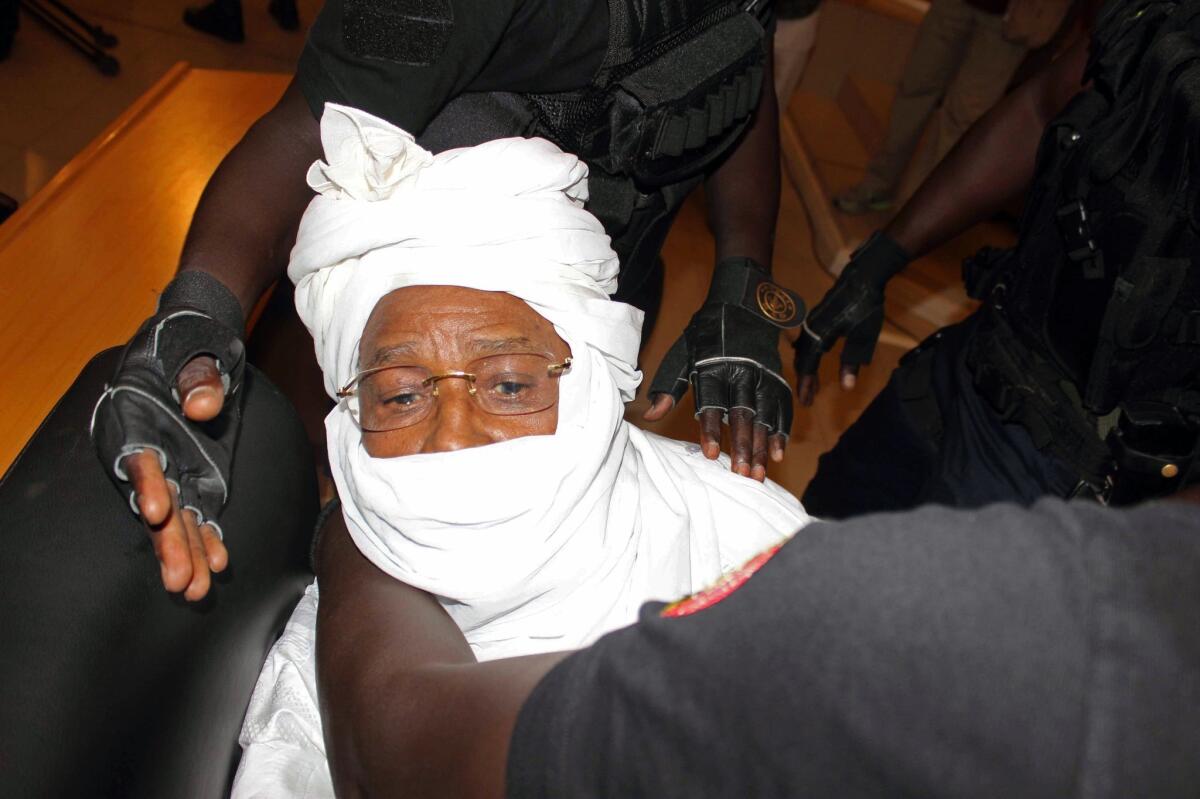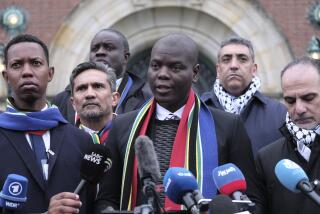Editorial: Will Africa punish an African dictator?

Security personnel surround former Chadian dictator Hissene Habre inside the court in Dakar, Senegal, on July 20. The trial of former Chadian dictator Hissene Habre, accused of overseeing the deaths of thousands, had a chaotic beginning Monday as security forces ushered the ex-leader into and then out of the Senegal courtroom amid protests by his supporters.
- Share via
For an eight-year period ending in 1990, when he was deposed by an insurgency led by one of his former proteges, President Hissene Habre of Chad led a dictatorial regime that human rights activists say was responsible for the deaths of more than 40,000 people. In the years since, Habre has lived in comfortable exile in a suburb of Dakar, the capital of Senegal, as that country, Chad, Belgium and the African Union wrangled over what to do with him.
Under pressure from the International Court of Justice to either prosecute Habre or extradite him, Senegal and the African Union established the Extraordinary African Chambers in Dakar two years ago to preside over Habre’s trial. Efforts to bring Habre to justice are laudable, and it’s particularly heartening that the case is being heard by a tribunal established by African nations operating under the concept of “universal jurisdiction,” the same precept under which Belgium indicted him in 2005 on charges of crimes against humanity. In effect, it means that despots cannot expect to hide from their crimes by fleeing the country where they were committed. And it is also gratifying for victims and survivors who, with the help of Human Rights Watch and other such groups, have campaigned doggedly to have Habre brought to justice.
The trial, which opened this week, got off to an inauspicious start. Habre, who was disruptive and was dragged from the courtroom Monday, has rejected the court’s authority, and his legal team did not show up Tuesday in protest, according to Reuters. Presiding Judge Gberdao Gustave Kam of Burkina Faso appointed three new lawyers to represent Habre and postponed proceedings until September to give the new legal team time to catch up. Though that might be seen as a stumble, it could also be a positive sign that the court does not intend to get derailed by Habre’s antics.
Africa has endured more than its share of tumultuous power grabs, coups, civil wars and genocidal campaigns, most conducted with impunity. The International Criminal Court at The Hague has, under certain conditions, jurisdiction over such transgressions that occurred after its creation in 2002. But that was long after Habre’s reign ended. And despite its jurisdiction over more than 120 signatory countries, and its power to prosecute cases referred by the United Nations Security Council, the court has so far brought cases only against black Africans, leading to accusations of bias.
Which makes Habre’s trial all the more significant. That the African Union itself has created a mechanism to bring charges against one of the continent’s bad actors offers hope for broader arenas of accountability.
Follow the Opinion section on Twitter @latimesopinion and Facebook
More to Read
A cure for the common opinion
Get thought-provoking perspectives with our weekly newsletter.
You may occasionally receive promotional content from the Los Angeles Times.









